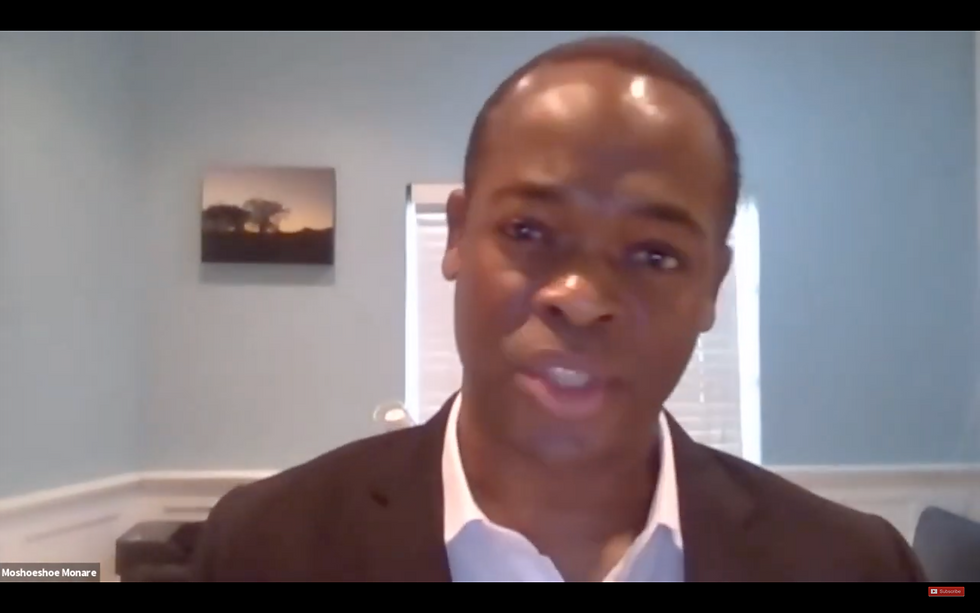Sustaining media as a public good
- frayintermedia

- May 18, 2021
- 3 min read
As the South African media strives to be sustainable in a COVID-19 climate – suppressing an already economically stifled industry – it is important for the public to be taken along on the journey to sustainability.

“This will lend credibility, support and legitimacy to our efforts and cause and prevent and quell any suspicions regarding motives and intentions,” said Arena Holdings managing director Moshoeshoe Monare at a recent South African National Editors’ Forum (SANEF) webinar.
The webinar was the final session in a series of four in-depth discussions focusing on the 69 recommendations by the panel overseeing the inquiry into media credibility and ethics. The inquiry was led by retired Judge Kathy Satchwell with fellow panel members author and veteran journalist Rich Mkhondo and award-winning journalist Nikiwe Bikitsha.
The inquiry was commissioned by SANEF to investigate editorial lapses that contributed to the decline of trust between the media and the public.
Speaking on Wednesday, May 5, Monare was joined by Nwabisa Makunga, editor of The Sowetan and Phathiswa Magopeni, editor-in-chief and group executive at SABC News and Current Affairs, in a session moderated by SANEF Access to Information and Media Policy Committee chair Izak Minnaar.
The session kicked off with research into media sustainability recommendations presented by ALT Advisory director Michael Power.

Power said this new research sought to give insights to contribute to SANEF’s mission of achieving media sustainability and universal access to public interest journalism.
“We have sourced from primarily an international comparative perspective, a variety of potential proposals that can be taken forward, developed and ultimately catered to the South African context to ensure that we can be closer towards the sustainability of access,” Power said.
A suggested strategy outlined in the research recommendations was the establishment of a media sustainability fund.

Makunga highlighted that it would be important to be intentional about what the media industry was trying to do to ensure its sustainability and why the option of such a fund was being explored.
“That's where the question of journalism as a public good comes into play as well as public service,” she said.
Minnaar drew from the Windhoek+30 Declaration to reiterate journalism’s role as a public good.
The declaration notes “information as a public good is also a key underpinning of effective measures to address global emergencies, such as climate and health crises, specifically the COVID-19 pandemic”.

Magopeni highlighted that journalism was about catering to all language and geographical communities through easily accessible universal channels. However, she said this remained an “idea” for public broadcaster SABC which was currently experiencing operational and funding challenges.
“It is known that the SABC is designated as a public broadcaster, but actually it operates its own commercial principles in terms of its business approach”.
“But it delivers its editorial content based on public service broadcasting efforts, which is a paradox because you are designated as one thing, but in the way you operate, you operate as something else, and this is evidenced in the way its revenue structure is constrained,” she said.
Monare said the South African public needs to be reminded that the media industry is burdened with “multiple and contradictory obligations”.
This includes the creation of value for shareholders. However, he said the media also has the duty to remind the public of “their right to know, to receive or impart information”.
“This demands a closer relationship with the audience, whether in the form of a strong customer care assistance or audience feedback. It demands of us to listen attentively, unassumingly and not arrogantly pretend that we are the only ones who can set the agenda,” Monare said.
To help set a more inclusive agenda for local media SANEF hosted an online conference on May 15. The event was a platform to debate key recommendations that came out of the four webinars. It was also a collaborative effort to develop a five-year action plan that will hopefully reflect more accountable, more factual and fairer reporting processes.
Watch the conference here.





Comments